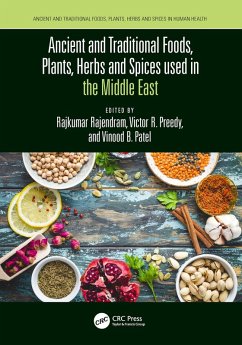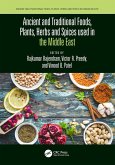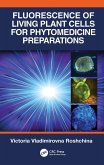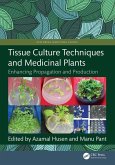Ancient and Traditional Foods, Plants, Herbs and Spices used in the Middle East (eBook, ePUB)
Redaktion: Rajendram, Rajkumar; Patel, Vinood; Preedy, Victor
173,95 €
173,95 €
inkl. MwSt.
Sofort per Download lieferbar

87 °P sammeln
173,95 €
Als Download kaufen

173,95 €
inkl. MwSt.
Sofort per Download lieferbar

87 °P sammeln
Jetzt verschenken
Alle Infos zum eBook verschenken
173,95 €
inkl. MwSt.
Sofort per Download lieferbar
Alle Infos zum eBook verschenken

87 °P sammeln
Ancient and Traditional Foods, Plants, Herbs and Spices used in the Middle East (eBook, ePUB)
Redaktion: Rajendram, Rajkumar; Patel, Vinood; Preedy, Victor
- Format: ePub
- Merkliste
- Auf die Merkliste
- Bewerten Bewerten
- Teilen
- Produkt teilen
- Produkterinnerung
- Produkterinnerung

Bitte loggen Sie sich zunächst in Ihr Kundenkonto ein oder registrieren Sie sich bei
bücher.de, um das eBook-Abo tolino select nutzen zu können.
Hier können Sie sich einloggen
Hier können Sie sich einloggen
Sie sind bereits eingeloggt. Klicken Sie auf 2. tolino select Abo, um fortzufahren.

Bitte loggen Sie sich zunächst in Ihr Kundenkonto ein oder registrieren Sie sich bei bücher.de, um das eBook-Abo tolino select nutzen zu können.
A volume in the Ancient and Traditional Foods, Plants, Herbs and Spices series, this book describes uses and applications of plant-based materials from different countries of the Middle East.
- Geräte: eReader
- mit Kopierschutz
- eBook Hilfe
Andere Kunden interessierten sich auch für
![Ancient and Traditional Foods, Plants, Herbs and Spices used in the Middle East (eBook, PDF) Ancient and Traditional Foods, Plants, Herbs and Spices used in the Middle East (eBook, PDF)]() Ancient and Traditional Foods, Plants, Herbs and Spices used in the Middle East (eBook, PDF)173,95 €
Ancient and Traditional Foods, Plants, Herbs and Spices used in the Middle East (eBook, PDF)173,95 €![Exploring Traditional Wild Edible Plants (eBook, ePUB) Exploring Traditional Wild Edible Plants (eBook, ePUB)]() Exploring Traditional Wild Edible Plants (eBook, ePUB)168,95 €
Exploring Traditional Wild Edible Plants (eBook, ePUB)168,95 €![Plants as Medicine and Aromatics (eBook, ePUB) Plants as Medicine and Aromatics (eBook, ePUB)]() Plants as Medicine and Aromatics (eBook, ePUB)54,95 €
Plants as Medicine and Aromatics (eBook, ePUB)54,95 €![Fluorescence of Living Plant Cells for Phytomedicine Preparations (eBook, ePUB) Fluorescence of Living Plant Cells for Phytomedicine Preparations (eBook, ePUB)]() Victoria Vladimirovna RoshchinaFluorescence of Living Plant Cells for Phytomedicine Preparations (eBook, ePUB)49,95 €
Victoria Vladimirovna RoshchinaFluorescence of Living Plant Cells for Phytomedicine Preparations (eBook, ePUB)49,95 €![Safety Concerns for Herbal Drugs (eBook, ePUB) Safety Concerns for Herbal Drugs (eBook, ePUB)]() Divya VohoraSafety Concerns for Herbal Drugs (eBook, ePUB)48,95 €
Divya VohoraSafety Concerns for Herbal Drugs (eBook, ePUB)48,95 €![Tissue Culture Techniques and Medicinal Plants (eBook, ePUB) Tissue Culture Techniques and Medicinal Plants (eBook, ePUB)]() Tissue Culture Techniques and Medicinal Plants (eBook, ePUB)178,95 €
Tissue Culture Techniques and Medicinal Plants (eBook, ePUB)178,95 €![Exploring Medicinal Orchids (eBook, ePUB) Exploring Medicinal Orchids (eBook, ePUB)]() Exploring Medicinal Orchids (eBook, ePUB)52,95 €
Exploring Medicinal Orchids (eBook, ePUB)52,95 €-
-
-
A volume in the Ancient and Traditional Foods, Plants, Herbs and Spices series, this book describes uses and applications of plant-based materials from different countries of the Middle East.
Dieser Download kann aus rechtlichen Gründen nur mit Rechnungsadresse in A, B, BG, CY, CZ, D, DK, EW, E, FIN, F, GR, HR, H, IRL, I, LT, L, LR, M, NL, PL, P, R, S, SLO, SK ausgeliefert werden.
Produktdetails
- Produktdetails
- Verlag: Taylor & Francis eBooks
- Seitenzahl: 391
- Erscheinungstermin: 25. August 2023
- Englisch
- ISBN-13: 9781000902709
- Artikelnr.: 68372439
- Verlag: Taylor & Francis eBooks
- Seitenzahl: 391
- Erscheinungstermin: 25. August 2023
- Englisch
- ISBN-13: 9781000902709
- Artikelnr.: 68372439
- Herstellerkennzeichnung Die Herstellerinformationen sind derzeit nicht verfügbar.
Victor R. Preedy BSc, PhD, DSc, FRSB, FRSPH, FRCPath, FRSC is a staff member of the Faculty of Life Sciences and Medicine within King's College London. Professor Preedy is also a member of the Department of Nutrition and Dietetics (teaching), Director of the Genomics Centre of King's College London and Professor of Clinical Biochemistry (Hon) at Kings College Hospital. Professor Preedy graduated in 1974 with an Honours Degree in Biology and Physiology with Pharmacology. He gained his University of London PhD in 1981. In 1992, he received his Membership of the Royal College of Pathologists and in 1993 he gained his second doctorate (DSc), for his outstanding contribution to protein metabolism in health and disease. Professor Preedy was elected as a Fellow to the Institute of Biology in 1995 and to the Royal College of Pathologists in 2000. Since then he has been elected as a Fellow to the Royal Society for the Promotion of Health (2004) and The Royal Institute of Public Health (2004). In 2009, Professor Preedy became a Fellow of the Royal Society for Public Health and in 2012 a Fellow of the Royal Society of Chemistry. Professor Preedy has carried out research when attached to Imperial College London, The School of Pharmacy (now part of University College London) and the MRC Centre at Northwick Park Hospital. He has collaborated with research groups in Finland, Japan, Australia, USA and Germany. Prof Preedy is a leading expert on the science of health and has a long-standing interest in dietary and plant based components. He has lectured nationally and internationally. To his credit, Professor Preedy has published over 700 articles, which includes peer-reviewed manuscripts based on original research, abstracts and symposium presentations, reviews and numerous books and volumes. Vinood B. Patel, BSc, PhD, FRSC, is currently Reader in Clinical Biochemistry at the University of Westminster and honorary fellow at King's College London. He presently directs studies on metabolic pathways involved in liver disease, particularly related to mitochondrial energy regulation and cell death. Research is being undertaken to study the role of nutrients, antioxidants, phytochemicals, iron, alcohol and fatty acids in the pathophysiology of liver disease. Other areas of interest are identifying new biomarkers that can be used for the diagnosis and prognosis of liver disease and understanding mitochondrial oxidative stress in Alzheimer's disease and gastrointestinal dysfunction in autism. Dr Patel graduated from the University of Portsmouth with a degree in Pharmacology and completed his PhD in protein metabolism from King's College London in 1997. His postdoctoral work was carried out at Wake Forest University Baptist Medical School studying structural-functional alterations to mitochondrial ribosomes, where he developed novel techniques to characterize their biophysical properties. Dr Patel is a nationally and internationally recognized researcher and has several edited biomedical books related to the use or investigation of active agents or components. These books include The Handbook of Nutrition, Diet, and Epigenetics, Branched Chain Amino Acids in Clinical Nutrition, Cancer: Oxidative Stress and Dietary Antioxidants and Diet Quality: An Evidence-Based Approach, Toxicology: Oxidative Stress and Dietary Antioxidants, Molecular Nutrition: Vitamins. In 2014 Dr Patel was elected as a Fellow to The Royal Society of Chemistry. Dr. Rajkumar Rajendram AKC BSc (Hons) MBBS (Dist) MRCP (UK) FRCA EDIC FFICM is a clinician scientist with a focus on internal medicine, anaesthesia, intensive care and peri-operative medicine. Dr Rajendram's interest in traditional medicines began at medical school when he attended the Society of Apothecaries' history of medicine course. He subsequently graduated with distinctions from Guy's, King's and St. Thomas Medical School, King's College London in 2001. As an undergraduate he was awarded several prizes, merits and distinctions in pre-clinical and clinical subjects. Dr. Rajendram completed his specialist training in acute and general medicine in Oxford in 2010 and then practiced as a Consultant in Acute General Medicine at the John Radcliffe Hospital, Oxford. Dr Rajendram also trained in anaesthesia and intensive care in London and was awarded fellowships of the Royal College of Anaesthetists (FRCA) and the Faculty of Intensive Care Medicine (FFICM) in 2009 and 2013 respectively. He then moved to the Royal Free London Hospital as a Consultant in Intensive Care, Anaesthesia and Peri-operative Medicine. He has been a fellow of the Royal College of Physicians of Edinburgh (FRCP Edin) and the Royal College of Physicians of London (FRCP Lond) since 2017 and 2019 respectively. He is currently a Consultant in Internal Medicine at King Abdulaziz Medical City, National Guard Health Affairs, Riyadh, Saudi Arabia. Dr. Rajendram recognises that integration of traditional medicines into modern paradigms for healthcare can significantly benefit patients. As a clinician scientist he has therefore devoted significant time and effort to nutritional science research and education. He is an affiliated member of the Nutritional Sciences Research Division of King's College London and has published over 300 textbook chapters, review articles, peer-reviewed papers and abstracts.
1. Grains and Pulses in Diets of the Middle East with a Focus on Buckwheat
2. Dietary Patterns in the Middle East and Fatty Liver Disease 3. Fatty
Acids in Different Foods of Middle Eastern Diets: Implications for Health
4. The Link of Lifestyle Patterns and Nutrition in Iran with Health and
Traditional Diets 5. Traditional Medicinal Foods in Persian Medicine: An
Overview of Current Evidence 6. Traditional Dietary Patterns in the
Elderly: Iranian Aspects 7. Syrian Herbs in Health and Disease 8. Aloe
Vera (Aloe Barbadensis) Usage in the Middle East: Applications for
Gastroesophageal Reflux 9. Arta (Calligonum Comosum) in the Middle East
and Biomedical Applications 10. Conehead Thyme/Thymus Capitatus (Thymus
Capitatus) and Evidence-Based Usage in Eradicating Helicobacter Pylori 11.
Cumin (Cuminum Cyminum) Usage in the Middle East and Biological Basis of
its Actions 12. Frankincense (Boswellia Sacra Flueck.) and its Usage in
the Middle East: Molecular, Cellular and Biomedical Aspects 13. Khella
(Ammi Visnaga), Molecular and Cellular Aspects and Potential in
Biomedicine 14. French Marigold (Tagetes Patula L.): Phytochemical and
Bioactive Targets of Secondary Metabolites 15. Oak Gall (Quercus
Infectoria G. Olivier Gall): Pharmaceutical Usage and Cellular Targets 16.
Pelargonium Species and their Usage in the Middle East as Medicinal Herbs
17. Saffron (Crocus Sativus) as a Middle East Herb: Traditional and Modern
Medicinal Applications 18. Sage Plants (Salvia sp.; Lamiaceae) in the
Middle East: Phytochemistry, Ethnopharmacology and Traditional Use 19.
Paronychia Argentea L. Usage in the Middle East (Jordan) and its Biomedical
Profiles 20. Taily Weed (Ochradenus Baccatus Delile) as a Middle Eastern
Herbal: Biological Activities and Profiles 21. Tomato (Lycopersicon
Esculentum Miller) from Egypt and Phytochemical Usage; Phenolics and
Flavonoids 22. Turmeric (Curcuma Longa L.) Usage in the Middle East: A
Comprehensive Review 23. Veined Dock (Rumex Pictus Forssk.) Usage in the
Middle East, Phytochemical Constituents, and Biological Effects of the
Extracts 24. Recommended Resources for the Scientific Study of Foods,
Plants, Herbs, and Spices Used in the Middle East
2. Dietary Patterns in the Middle East and Fatty Liver Disease 3. Fatty
Acids in Different Foods of Middle Eastern Diets: Implications for Health
4. The Link of Lifestyle Patterns and Nutrition in Iran with Health and
Traditional Diets 5. Traditional Medicinal Foods in Persian Medicine: An
Overview of Current Evidence 6. Traditional Dietary Patterns in the
Elderly: Iranian Aspects 7. Syrian Herbs in Health and Disease 8. Aloe
Vera (Aloe Barbadensis) Usage in the Middle East: Applications for
Gastroesophageal Reflux 9. Arta (Calligonum Comosum) in the Middle East
and Biomedical Applications 10. Conehead Thyme/Thymus Capitatus (Thymus
Capitatus) and Evidence-Based Usage in Eradicating Helicobacter Pylori 11.
Cumin (Cuminum Cyminum) Usage in the Middle East and Biological Basis of
its Actions 12. Frankincense (Boswellia Sacra Flueck.) and its Usage in
the Middle East: Molecular, Cellular and Biomedical Aspects 13. Khella
(Ammi Visnaga), Molecular and Cellular Aspects and Potential in
Biomedicine 14. French Marigold (Tagetes Patula L.): Phytochemical and
Bioactive Targets of Secondary Metabolites 15. Oak Gall (Quercus
Infectoria G. Olivier Gall): Pharmaceutical Usage and Cellular Targets 16.
Pelargonium Species and their Usage in the Middle East as Medicinal Herbs
17. Saffron (Crocus Sativus) as a Middle East Herb: Traditional and Modern
Medicinal Applications 18. Sage Plants (Salvia sp.; Lamiaceae) in the
Middle East: Phytochemistry, Ethnopharmacology and Traditional Use 19.
Paronychia Argentea L. Usage in the Middle East (Jordan) and its Biomedical
Profiles 20. Taily Weed (Ochradenus Baccatus Delile) as a Middle Eastern
Herbal: Biological Activities and Profiles 21. Tomato (Lycopersicon
Esculentum Miller) from Egypt and Phytochemical Usage; Phenolics and
Flavonoids 22. Turmeric (Curcuma Longa L.) Usage in the Middle East: A
Comprehensive Review 23. Veined Dock (Rumex Pictus Forssk.) Usage in the
Middle East, Phytochemical Constituents, and Biological Effects of the
Extracts 24. Recommended Resources for the Scientific Study of Foods,
Plants, Herbs, and Spices Used in the Middle East
1. Grains and Pulses in Diets of the Middle East with a Focus on Buckwheat
2. Dietary Patterns in the Middle East and Fatty Liver Disease 3. Fatty
Acids in Different Foods of Middle Eastern Diets: Implications for Health
4. The Link of Lifestyle Patterns and Nutrition in Iran with Health and
Traditional Diets 5. Traditional Medicinal Foods in Persian Medicine: An
Overview of Current Evidence 6. Traditional Dietary Patterns in the
Elderly: Iranian Aspects 7. Syrian Herbs in Health and Disease 8. Aloe
Vera (Aloe Barbadensis) Usage in the Middle East: Applications for
Gastroesophageal Reflux 9. Arta (Calligonum Comosum) in the Middle East
and Biomedical Applications 10. Conehead Thyme/Thymus Capitatus (Thymus
Capitatus) and Evidence-Based Usage in Eradicating Helicobacter Pylori 11.
Cumin (Cuminum Cyminum) Usage in the Middle East and Biological Basis of
its Actions 12. Frankincense (Boswellia Sacra Flueck.) and its Usage in
the Middle East: Molecular, Cellular and Biomedical Aspects 13. Khella
(Ammi Visnaga), Molecular and Cellular Aspects and Potential in
Biomedicine 14. French Marigold (Tagetes Patula L.): Phytochemical and
Bioactive Targets of Secondary Metabolites 15. Oak Gall (Quercus
Infectoria G. Olivier Gall): Pharmaceutical Usage and Cellular Targets 16.
Pelargonium Species and their Usage in the Middle East as Medicinal Herbs
17. Saffron (Crocus Sativus) as a Middle East Herb: Traditional and Modern
Medicinal Applications 18. Sage Plants (Salvia sp.; Lamiaceae) in the
Middle East: Phytochemistry, Ethnopharmacology and Traditional Use 19.
Paronychia Argentea L. Usage in the Middle East (Jordan) and its Biomedical
Profiles 20. Taily Weed (Ochradenus Baccatus Delile) as a Middle Eastern
Herbal: Biological Activities and Profiles 21. Tomato (Lycopersicon
Esculentum Miller) from Egypt and Phytochemical Usage; Phenolics and
Flavonoids 22. Turmeric (Curcuma Longa L.) Usage in the Middle East: A
Comprehensive Review 23. Veined Dock (Rumex Pictus Forssk.) Usage in the
Middle East, Phytochemical Constituents, and Biological Effects of the
Extracts 24. Recommended Resources for the Scientific Study of Foods,
Plants, Herbs, and Spices Used in the Middle East
2. Dietary Patterns in the Middle East and Fatty Liver Disease 3. Fatty
Acids in Different Foods of Middle Eastern Diets: Implications for Health
4. The Link of Lifestyle Patterns and Nutrition in Iran with Health and
Traditional Diets 5. Traditional Medicinal Foods in Persian Medicine: An
Overview of Current Evidence 6. Traditional Dietary Patterns in the
Elderly: Iranian Aspects 7. Syrian Herbs in Health and Disease 8. Aloe
Vera (Aloe Barbadensis) Usage in the Middle East: Applications for
Gastroesophageal Reflux 9. Arta (Calligonum Comosum) in the Middle East
and Biomedical Applications 10. Conehead Thyme/Thymus Capitatus (Thymus
Capitatus) and Evidence-Based Usage in Eradicating Helicobacter Pylori 11.
Cumin (Cuminum Cyminum) Usage in the Middle East and Biological Basis of
its Actions 12. Frankincense (Boswellia Sacra Flueck.) and its Usage in
the Middle East: Molecular, Cellular and Biomedical Aspects 13. Khella
(Ammi Visnaga), Molecular and Cellular Aspects and Potential in
Biomedicine 14. French Marigold (Tagetes Patula L.): Phytochemical and
Bioactive Targets of Secondary Metabolites 15. Oak Gall (Quercus
Infectoria G. Olivier Gall): Pharmaceutical Usage and Cellular Targets 16.
Pelargonium Species and their Usage in the Middle East as Medicinal Herbs
17. Saffron (Crocus Sativus) as a Middle East Herb: Traditional and Modern
Medicinal Applications 18. Sage Plants (Salvia sp.; Lamiaceae) in the
Middle East: Phytochemistry, Ethnopharmacology and Traditional Use 19.
Paronychia Argentea L. Usage in the Middle East (Jordan) and its Biomedical
Profiles 20. Taily Weed (Ochradenus Baccatus Delile) as a Middle Eastern
Herbal: Biological Activities and Profiles 21. Tomato (Lycopersicon
Esculentum Miller) from Egypt and Phytochemical Usage; Phenolics and
Flavonoids 22. Turmeric (Curcuma Longa L.) Usage in the Middle East: A
Comprehensive Review 23. Veined Dock (Rumex Pictus Forssk.) Usage in the
Middle East, Phytochemical Constituents, and Biological Effects of the
Extracts 24. Recommended Resources for the Scientific Study of Foods,
Plants, Herbs, and Spices Used in the Middle East







